Dubai is Offering 1 Year Work Visas. Should You Spend a Year in the Emirates?
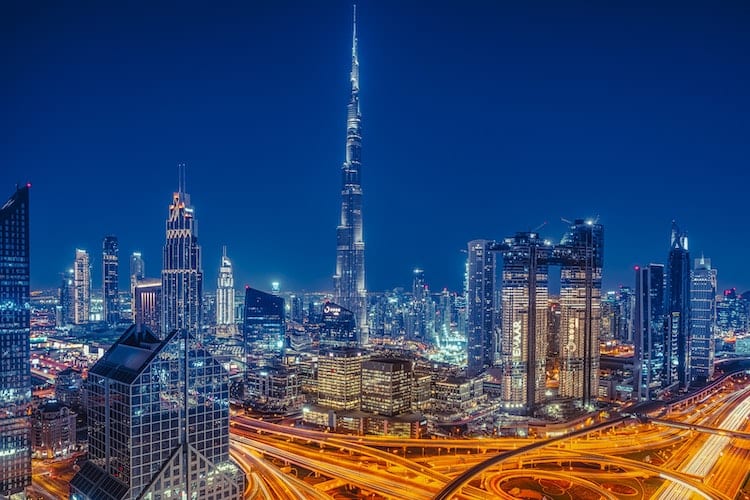
As remote work becomes more popular, workers have a lot more flexibility in the physical location of where they work. Roughly half of employees can work remotely at near full efficiency, and the coronavirus pandemic is further spurring that shift.
As workers drift away from offices, plenty of locations worldwide are trying to court them. A number of cities, states, and countries have already launched incentivized initiatives to draw remote workers.
One of the most exciting new programs is in Dubai, where the government is offering one-year work visas and a wide range of other perks to anyone who relocates to the city while working remotely for international companies. Interested in spending a year in one of the most beautiful cities in the world? We thought so.
Dubai’s Remote Work Visa Initiative
To entice travelers to its capital city, the United Arab Emirates (UAE) is offering some strong perks. First off, the country has no income tax for individuals. If you currently live in a state with a high-income tax, you could save a lot of money living in Dubai. If you’re a U.S. citizen, you’re still subject to U.S. federal income tax, however, and will need to file regularly.
Once in the city, you’d have access to whatever utilities and services you need, including schooling options if you travel with your children. Typically benefits like these are only available to residents, but the country will allow those on year-long visas to access them.
To be eligible, you must have:
- A passport valid for at least six months
- Health insurance with valid coverage in the UAE
- Proof of Employment from your current employer and a contract valid for one year
- At least a $5,000 monthly salary (basically $60K/year), last month’s payslip, and last three months’ bank statements;
- OR proof of ownership of a company for one year or more, same income and bank statement requirements
If you meet all the requirements, you just need to pay a $287 fee to qualify, plus the insurance cost.
“The global pandemic has changed how we live and work. As multinationals and leading start-ups across the world accelerate their rates of digital adoption, the need to be physically present to fulfill professional responsibilities has been redefined,” His Excellency Helal Saeed Almarri, director-general of Dubai’s Department of Tourism and Commerce Marketing, said in a statement. “People continue to prioritize their health, wellbeing, and ability to ensure a positive work-life balance. Dubai is uniquely positioned to offer a safe, dynamic lifestyle opportunity to these digitally savvy workers and their families while they continue to work remotely, whether it is for a couple of months or an entire year.”
If you’re interested in applying, you can find more information on Dubai’s tourism page.
Why Dubai?
The government of Dubai has clear goals in offering these visas. The city hopes to attract more innovators, and business people to help expand Dubai’s economy and raise its profile as a hub of entrepreneurship.
In addition, Dubai is a beautiful city, regarded by many as one of the most impressive in the world. According to Resonance Consultancy, which holistically ranks the best urban destinations annually, Dubai is the 6th best city on Earth. Resonance considers factors including location, diversity, prosperity, and this year, handling of COVID-19.
“The city reinvented itself yet again throughout the 2010s, growing from a sterile playground for a handful of ultra-rich Emiratis to an international tourism and business destination,” according to the Resonance rankings.
The Dubai Corporation of Tourism & Commerce Marketing also points out some perks of the bustling city. Dubai is a sprawling metropolis along the water, providing residents and tourists with a unique city experience. It’s also one of the fastest-growing cities in the world and changes in new in interesting ways almost every year.
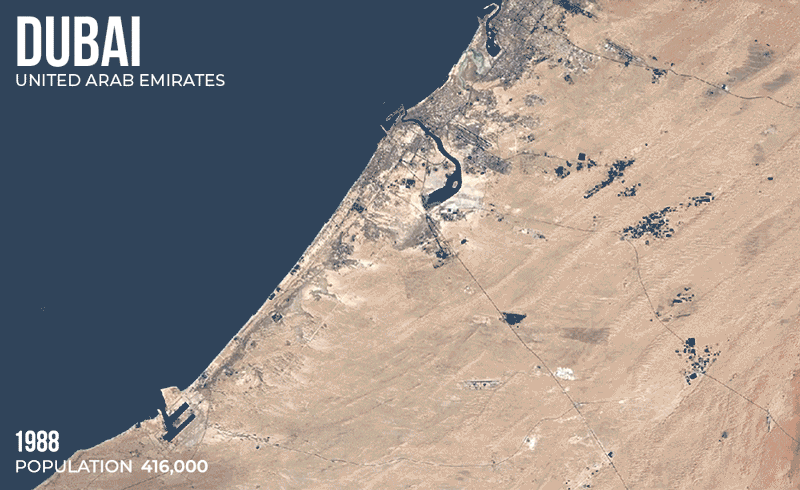
“With sandy beaches, incredible dining, and world-class entertainment, you’re offered a great quality of life and a range of attractions – with world-class safety and hygiene measures,” according to Dubai’s Corporation of Tourism.
What You Should Know About Dubai
Outside of what will draw you in, there’s tons of useful information to know about Dubai and the UAE before you commit to a move. For starters, Dubai is a city, but it is also the name of one of seven states, or emirates, under the umbrella of the United Arab Emirates. Each of the seven emirates has a monarch and municipal government, and the seven monarchs collectively rule the country as the Federal Supreme Council. Arabic is the official language of the country, but many in the UAE speak English.
The UAE is the eighth richest country on earth in terms of GDP per capita, and Dubai is the crown jewel of the region. The currency in the country is the Emirati dirham, and $1 USD is worth about 3.67 Dhs. Unlike other currencies, the dirham is linked to the dollar, so you won’t experience daily fluctuations in value. Virtually all major credit cards are accepted in Dubai, so you won’t need to worry about toting around cash anyway. Dirhams look more like Euros than U.S. dollars and come in different colors and denominations up to 1,000 Dhs.
Although the city is very wealthy, it’s not terribly expensive to live in. According to Numbeo, the world’s largest cost of living database, it’s actually less expensive than many major world hubs.
For reference, Numbeo estimates that the average family of four, in one month excluding rent, would spend:
- $4,850 in New York City
- $3,864 in London
- $3,807 in Chicago
- $3,803 in Los Angeles
- $3,301 in Dubai
- $2,844 in Madrid
Leases in Dubai are typically locked in for one year. Many expats rent apartments, homes, or villas while living in the UAE, so plenty of housing options exist in the country. Often utilities are separate from rent, but often cost about $150 per month, which is typical in America as well.
Dubai is also a safe city, both in terms of the pandemic and in general. The World Travel and Tourism Council awarded the City a Safe Travel stamp for its safety and hygiene protocols. Moreover, crime is not a major concern in Dubai, although petty crimes do occur.
Foreign travelers should be aware of Dubai’s laws, however, since certain things are outlawed there that are legal here. For instance, in Dubai, same-sex marriage is outlawed, swearing can land you in jail, and public displays of affection are frowned upon. The U.S. State Department has a helpful guide to Dubai dos and don’ts.
Lastly, if you’re going to be working remotely, you’ll need solid internet access. The UAE offers the best connection speeds of any country in the Arab Gulf, and download speeds in the country have been increasing every year.
Attractions and Activities in Dubai
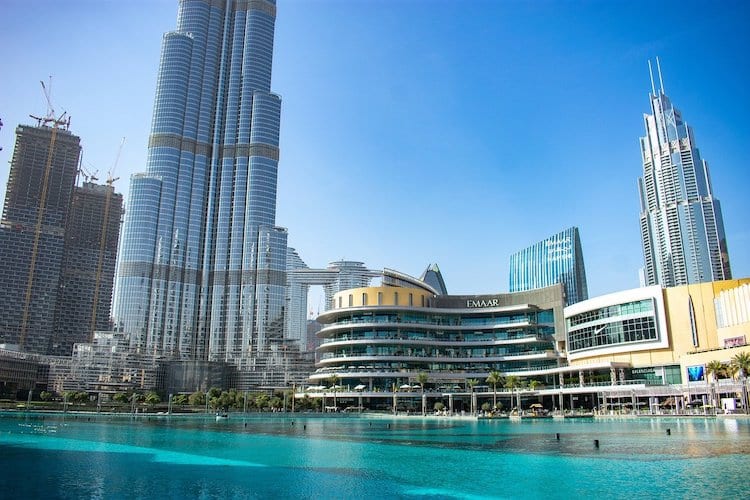
As mentioned above, there’s a lot to do in Dubai. There are a few monuments and skyscrapers that stand out and are sure to catch your eye as soon as you see the city. The Burj Khalifa is the tallest building in the world, and tourists can take a high-speed elevator to an observation deck on the top.
There’s also the Dubai Frame, a 500-foot tall picture frame that symbolizes the developments between the old and new city.
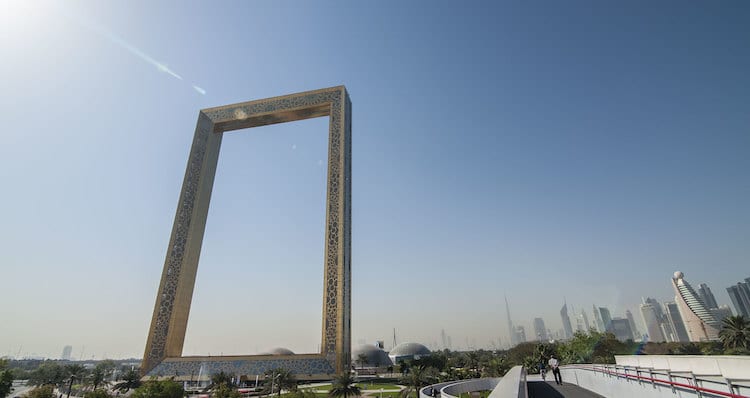
Neighboring the Burj Khalifa is the Dubai Mall. Although it may look tiny next to its 2,722-foot tall companion, the Mall is one of the biggest in the world. It’s home to a ski park, aquarium, 1,300+ retail stores, and 200+ dining options.

The other best-known building in Dubai is the Burj Al Arab, a 56-story hotel designed to resemble a sail on a boat. The hotel is located on a man-made beach and slightly offset from the city center, making it a perfect vacation destination for anyone passing through Dubai.
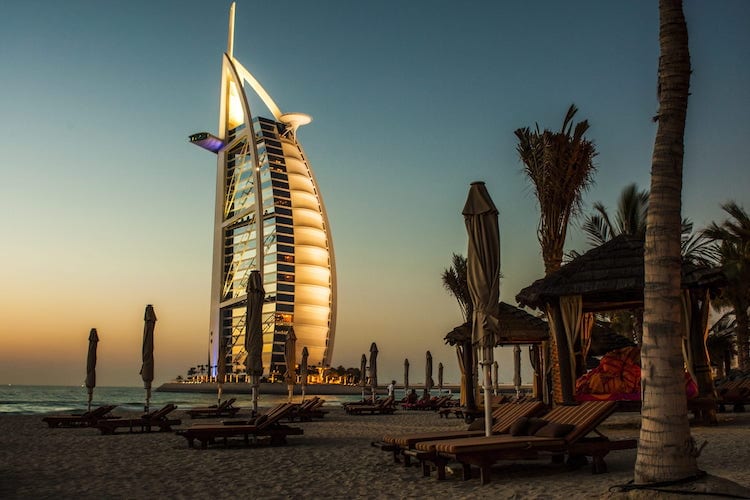
No matter your interests, Dubai will have something for you. For history lovers, there is the picturesque Jumeirah Mosque and the Al Fahadi Historical Neighborhood which offers a look at Dubai’s past. Families will love the massive Aquaventure Waterpark, as well as Legoland Dubai. And if you want to immerse yourself in culture, check out the Dubai Opera House or the Ethiad Museum.
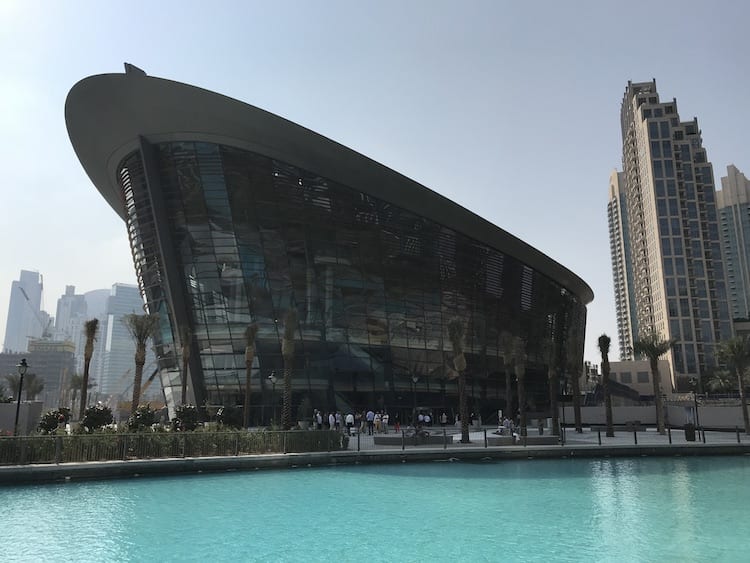
Stories From American Expats in the UAE
The UAE is a very diverse country, but Americans actually make up one of the largest groups of expatriates. More than 50,000 Americans live in the country, and their experience can provide insight into what the move might be like for you. Should you take the plunge and move to Dubai, a good first move would be to join the Americans in UAE Facebook group. There, Americans share resources, tips, and advice on how to integrate into life in the new city.
There are also tons of blogs and stories written by Americans living in Dubai to help you get settled in. For instance, a Floridian woman named Jayna Jervey shared her experiences, noting that the language barrier, in particular, was not hard to overcome.
“I don’t speak Arabic, but the funny thing about Dubai is that not many people speak Arabic there,” she said. “Everyone speaks English, and about 80 percent of Dubai’s population is expats. We outnumber the locals by quite a bit.”
The ExpatsBlog also has a compilation of interviews and blogs from Americans who spent time in the UAE. Moving anywhere can be a culture shock, let alone moving halfway around the world, so it’s not a bad idea to get a sense of how other people in your shoes felt. You’ll often come across useful advice too. One expat named Gina, for example, recommended: “Learn the history of the region, be open-minded and be patient.”
If you want to see more of the world than just Dubai, there are tons of great travel destinations nearby too. Georgia, for example, a country along the Black Sea, is just a three-hour flight from Dubai, and one of the world’s emerging luxury locations. Also within a four-hour plane radius are Cairo, Egpyt; Dehli, India; Amman, Jordan; and more! Living in Dubai lets you access a number of European, Asian, African, and Middle Eastern locations with relative ease.
Food In Dubai
One of the most challenging parts of moving to a foreign country can be adjusting your diet. While you shouldn’t have a hard time finding the staples of any diet in Dubai, you’ll probably still be out of your comfort zone a bit.
You can (and should) try some of the traditional food in the region. Seafood and vegetable dishes are common, and you should expect plenty of zest and flavor in whatever you’re eating.
In terms of food shopping, there are plenty of grocers in the UAE that expats can scour for products from home. Also, it’s worth noting that while pork is illegal under Islamic Law, non-Muslims can still buy pork products at stores in Dubai.
The Bottom Line on Remote Work in Dubai
A move to Dubai may not be for everyone, but it’s more accessible now than ever. You should certainly do your research before making any decisions, but there’s a lot to like about what Dubai is offering to remote workers. If you have the job flexibility and want to travel, this might make a lot of sense!
You can find the official details and apply for a visa through Dubai’s tourism site.
Riḥlah saʿīdah! (Bon voyage in Arabic!)









